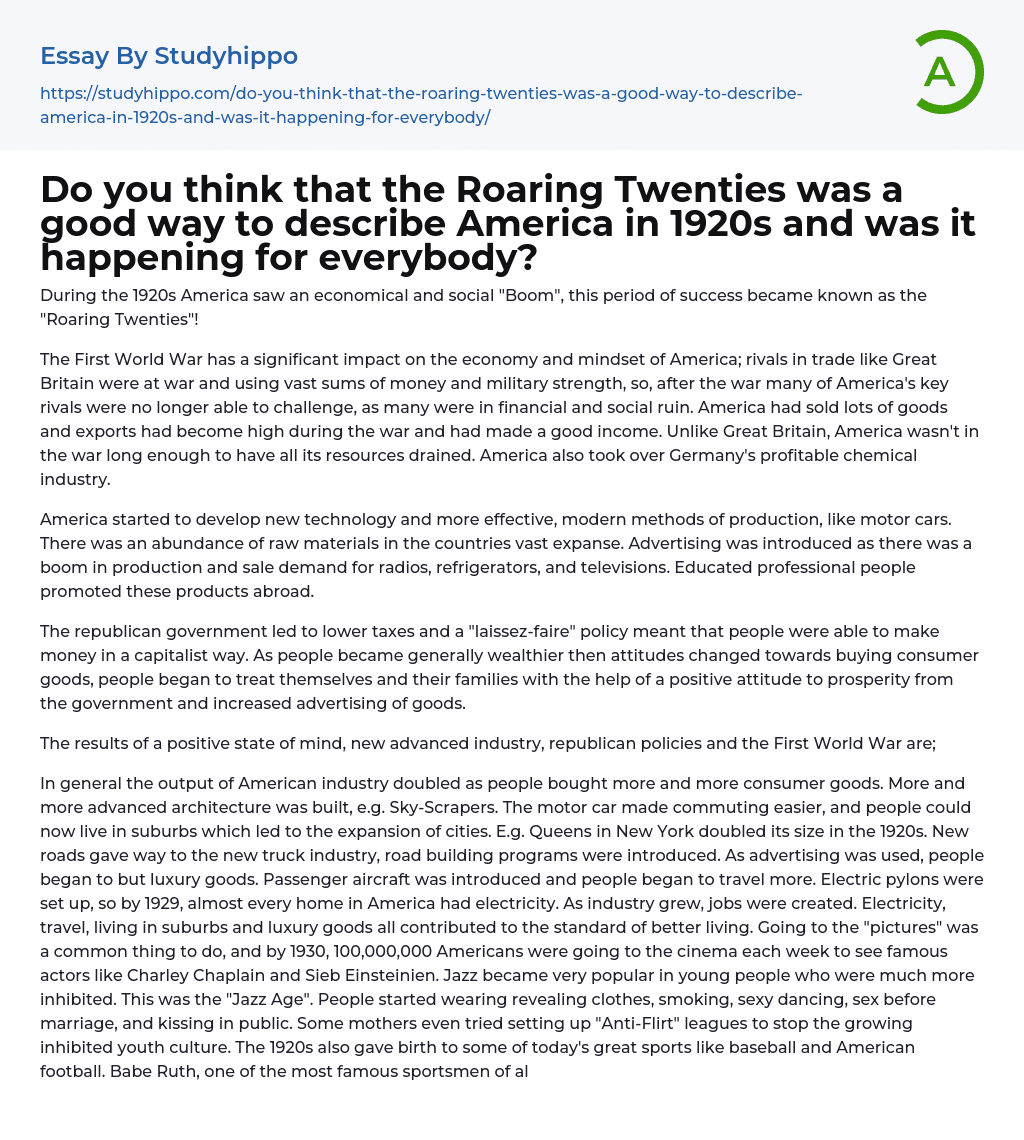The period of economic and social prosperity in America during the 1920s, known as the "Roaring Twenties," was influenced by the First World War. This war left many trade rivals, like Great Britain, in financial and social ruin, giving America a competitive advantage. During the war, America sold a large amount of goods and saw an increase in exports, resulting in a strong income. Unlike Great Britain, America did not suffer from depleted resources due to the war's extended duration. Furthermore, America gained control over Germany's profitable chemical industry and began developing new technology and modern production methods such as motor cars.
Raw materials were plentiful in many countries, leading to a surge in production and sales of radios, refrigerators, and televisions. To meet the high demand for these products, advertising was introduced. Educated professionals played a key role in promoting these goods globally. The republic
...an government implemented lower taxes and a "laissez-faire" policy that enabled individuals to accumulate wealth through capitalism. As people's wealth increased, their attitudes towards consumer goods shifted. They began indulging themselves and their families more frequently, influenced by the government's optimistic view on prosperity and intensified marketing campaigns.
Positive mindset, technological advancements, political policies, and the impact of the First World War all played a part in bringing about positive outcomes in America. One notable consequence was the American industry doubling its output due to growing consumer demand for goods. This era also saw the creation of groundbreaking architectural wonders such as Sky-Scrapers. Additionally, the easy accessibility of motor cars made commuting more convenient, allowing individuals to live in suburbs and contributing to urban growth and expansion.
In the 1920s, Queens in New
York experienced a twofold expansion as new roads were constructed, leading to the growth of the truck industry. At the same time, road building initiatives were put into action. This resulted in increased advertisements and subsequently led to individuals buying more luxury goods.
By 1929, the introduction of passenger aircraft and electric pylons had brought electricity to almost every American home. This development brought forth various positive changes such as increased travel opportunities, better living conditions in suburbs, and access to luxury goods. Furthermore, the growth of industry led to the creation of new jobs, ultimately contributing to an improved standard of living. The emergence of cinema as a popular form of entertainment drew approximately 100 million Americans to weekly screenings where they could watch renowned actors like Charley Chaplain and Sieb Einsteinien. Additionally, jazz became increasingly popular among young people who sought a more liberated lifestyle.
During the "Jazz Age", society witnessed a significant shift in behavior. Individuals embraced a more liberated lifestyle, marked by the adoption of revealing clothing, smoking, provocative dancing, premarital sex, and public displays of affection. In an attempt to thwart this emerging youthful culture, certain mothers formed "Anti-Flirt" leagues. Additionally, the 1920s saw the rise of iconic sports such as baseball and American football. Babe Ruth, a renowned sportsman, reached the peak of his career during this decade. The era also witnessed a growing inclination towards capitalism, with the widespread belief that anyone could attain wealth.
In the early 20s, the establishment of the Ku Klux Klan during the 1920s impacted immigration and the treatment of black individuals in the Deep South. With a membership count of 5 million, this organization fueled
prejudice and racism towards ethnic minorities such as Jews, Catholics, and foreigners. These groups often faced attacks, crimes, and discrimination. Additionally, the 18th amendment of the constitution prohibited the consumption of alcoholic beverages with more than 0.5% alcohol content. This ban took effect on Jan 11th, 1920, leading to the emergence of underground saloon bars that required a password for entry. Bootleggers played a role in transporting alcohol from these secret distilleries or illegally importing it from abroad.
During this time, there was a considerable increase in crime, resulting in the emergence of notorious figures such as Al Capone, who controlled the law in Chicago. Additionally, the food industry experienced growth, leading to a higher demand for wheat grain. Consequently, farms in the Mid-Western region of America began producing large quantities of this crop. For many, the 1920s represented a period of opportunity and prosperity, characterized by advancements in technology, the film industry, and the Jazz movement. This resulted in an overall improvement in morale and living standards. However, ethnic minorities, rural residents, religious groups, and black individuals faced prejudice and discrimination during this era.
During this period, farmers engaged in excessive production, leading to a decrease in their prices. Simultaneously, bootleggers produced alcohol wherever there was a demand for it. In general, the term "Roaring" accurately portrayed this era, but it did not apply to the majority of minority groups.
- John Locke essays
- 9/11 essays
- A Good Teacher essays
- A Healthy Diet essays
- A Modest Proposal essays
- A&P essays
- Academic Achievement essays
- Achievement essays
- Achieving goals essays
- Admission essays
- Advantages And Disadvantages Of Internet essays
- Alcoholic drinks essays
- Ammonia essays
- Analytical essays
- Ancient Olympic Games essays
- APA essays
- Arabian Peninsula essays
- Argument essays
- Argumentative essays
- Art essays
- Atlantic Ocean essays
- Auto-ethnography essays
- Autobiography essays
- Ballad essays
- Batman essays
- Binge Eating essays
- Black Power Movement essays
- Blogger essays
- Body Mass Index essays
- Book I Want a Wife essays
- Boycott essays
- Breastfeeding essays
- Bulimia Nervosa essays
- Business essays
- Business Process essays
- Canterbury essays
- Carbonate essays
- Catalina de Erauso essays
- Cause and Effect essays
- Cesar Chavez essays
- Character Analysis essays
- Chemical Compound essays
- Chemical Element essays
- Chemical Substance essays
- Cherokee essays
- Cherry essays
- Childhood Obesity essays
- Chlorine essays
- Classification essays
- Cognitive Science essays




